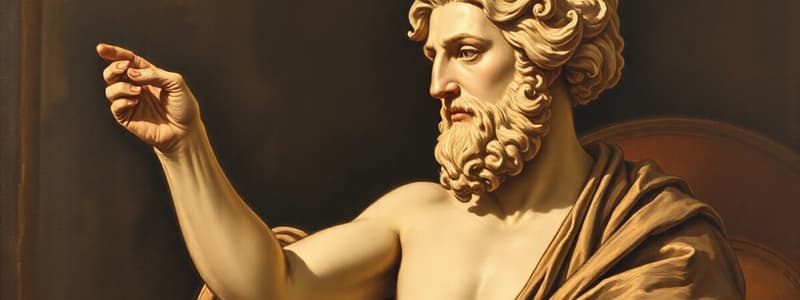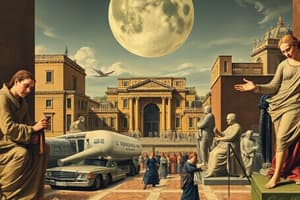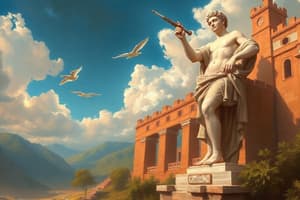Podcast
Questions and Answers
The Renaissance era was characterized by a focus on _____ art.
The Renaissance era was characterized by a focus on _____ art.
realistic
What is the name of the largest cathedral building of the Renaissance era?
What is the name of the largest cathedral building of the Renaissance era?
St. Peter's Basilica
Michelangelo's famous sculptures "The Pieta" and "David" were created before he reached what age?
Michelangelo's famous sculptures "The Pieta" and "David" were created before he reached what age?
- Fifty
- Twenty
- Forty
- Thirty (correct)
Which of these was NOT a field of expertise for Leonardo da Vinci?
Which of these was NOT a field of expertise for Leonardo da Vinci?
Raphael's work was admired for its simplicity and ease of composition.
Raphael's work was admired for its simplicity and ease of composition.
What art technique did Donatello excel in, focusing on shallow relief sculptures?
What art technique did Donatello excel in, focusing on shallow relief sculptures?
The Renaissance was a transitional period from the _____ era to the Early Modern Age.
The Renaissance was a transitional period from the _____ era to the Early Modern Age.
Which of these artworks is NOT attributed to Leonardo da Vinci?
Which of these artworks is NOT attributed to Leonardo da Vinci?
Which city was the birthplace of the Italian Renaissance?
Which city was the birthplace of the Italian Renaissance?
Match the famous Renaissance artists to their most notable artworks:
Match the famous Renaissance artists to their most notable artworks:
Michelangelo's "Pieta" was created in the late 1500s.
Michelangelo's "Pieta" was created in the late 1500s.
Flashcards
Renaissance Period
Renaissance Period
A period of great artistic and intellectual achievement in Europe (1400-1600), marked by a renewed interest in classical art and philosophy.
Italian Renaissance
Italian Renaissance
The beginning of the Renaissance in Italy, starting in the late 14th century.
Secular Art
Secular Art
Art not focused on religious themes.
Humanistic Art
Humanistic Art
Signup and view all the flashcards
Accurate Anatomy
Accurate Anatomy
Signup and view all the flashcards
Scientific Perspective
Scientific Perspective
Signup and view all the flashcards
Pieta
Pieta
Signup and view all the flashcards
Michelangelo
Michelangelo
Signup and view all the flashcards
David
David
Signup and view all the flashcards
Leonardo da Vinci
Leonardo da Vinci
Signup and view all the flashcards
The Last Supper
The Last Supper
Signup and view all the flashcards
Mona Lisa
Mona Lisa
Signup and view all the flashcards
Raphael
Raphael
Signup and view all the flashcards
Donatello
Donatello
Signup and view all the flashcards
Bas-relief
Bas-relief
Signup and view all the flashcards
St. Peter's Basilica
St. Peter's Basilica
Signup and view all the flashcards
Symmetry
Symmetry
Signup and view all the flashcards
Bronze Statue of David
Bronze Statue of David
Signup and view all the flashcards
Classical Greek Ideal
Classical Greek Ideal
Signup and view all the flashcards
Study Notes
Renaissance Period (1400-1600)
- Marked a period of economic growth and artistic enthusiasm
- Renewed interest in classical philosophy and art
- Began in late 14th century Italy
- Focused on realistic and humanistic art
- Characterized by accurate anatomy, scientific perspective, and detailed landscapes
- Renaissance painters depicted realistic human figures
- Architecture featured symmetry and balance, reflecting classical Greek ideals
- Emphasized well-rounded individuals knowledgeable in various fields (philosophy, science, arts, etc.) and who used their knowledge for productive and creative endeavors.
- A significant period of artistic experimentation, bringing a new way of looking at the world, similar to Greek art
- Marked the transition from the Medieval Period to the Early Modern Age in Europe
- The rebuilding of St. Peter's Basilica in Rome was a major architectural achievement of the period
Famous Renaissance Artists
- Michelangelo
- Born: March 6, 1475
- Died: February 18, 1564
- Notable works include The Pieta, David, The Last Judgement, and scenes from Genesis in the Sistine Chapel.
- Leonardo da Vinci
- Born: April 15, 1452
- Died: May 2, 1519
- Known for The Last Supper and Mona Lisa, among other paintings, drawings, sculptures, scientific discoveries, and engineering designs. Considered a true "Renaissance Man" for his diverse talents.
- Raphael
- Born: April 6, 1483
- Died: April 6, 1520
- Famous for clarity of form, ease of composition, and visual representation of Christian doctrines. Notable works include the Sistine Madonna, The Transfiguration, and The School of Athens.
- Donatello
- Born: 1386
- Died: December 12, 1466
- Famous for his sculptures, especially David, Saint George, and the Equestrian Monument of Gattamelata.
Key Artworks
- Mona Lisa: A famous portrait by Leonardo da Vinci.
- The Pieta: A sculpture by Michelangelo.
- David: A sculpture by Michelangelo and Donatello.
- The Last Judgment: A fresco by Michelangelo.
Studying That Suits You
Use AI to generate personalized quizzes and flashcards to suit your learning preferences.




